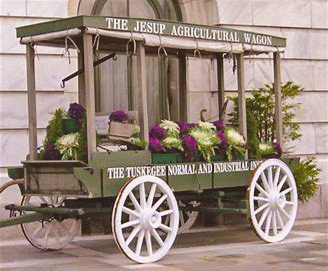A leader in agriculture innovation
Dr. George Washington Carver inspires GWCFRI because of his innovation and his willingness to teach. Born on a farm around 1864 near Diamond, MO, Carver was well-educated obtaining his Bachelor of Science degree and a Master of Science in bacterial botany and agriculture. His accomplishments continued having been awarded honorary doctorate degrees from Iowa State and Simpson College, and become the first Black faculty member of Iowa College. His study of agriculture continued as the leader of the Agriculture Department at Tuskee Normal and Industrial Institute (later known as Tuskegee University).
A teacher, artist, and food scientist
Dr. Carver spent much of his years dedicated to helping farmers improve the quality of their soil. Many poor southern farmers learned from Dr. Carver, applying his teaching of crop rotation to improve the nutrients in the soil of their cotton and tobacco farms. He is well-known for the Jesup Wagon, pulled by mules, to travel throughout the blackbelt and share his expertise in proper crop rotation, harvesting, and preparing meals. Dr. Carver was also an avid artist and would use colors extracted from plants to beautify homes. He is best known for his work developing 300+ uses for peanuts.
Dr. Carver’s Jesup Wagon
The Jesup Wagon was a tool that Dr. Carver used to educate farmers. He used this wagon as a demonstration laboratory, teaching about soil, food preservation and preparation, and leading farmers toward success.

